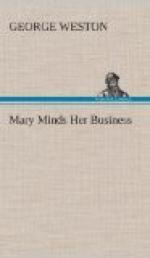For a moment she seemed to be in touch with the infinite plan. Down the hill she saw a woman in a black dress, crossing the street.
“Mrs. Ridge going out for the day,” thought Mary, recognizing the figure below. “Yes, and who knows? She may be a link in a chain which is leading straight down to some one who will be greater than Washington—greater than Shakespeare—greater than any man who ever lived...!” And her old dreams, her old visions beginning to return, she added with a sigh, “Oh, dear! I wish I could do something big and noble—so if all those millions who are back of me are watching, they’ll feel proud of what I’m doing and nudge each other as if they were saying, ’You see? She’s come at last. That’s us!’”
As you will realize, this last thought of Mary’s suggested more than it told—as I believe great thoughts often do—but at least I think you’ll be able to grasp the idea which she herself was groping after. At the same time you mustn’t suppose that she was constantly going around dreaming, and trying to find expression for those vague strivings and yearnings which come to us all at different times in our lives, especially in the golden days of youth when the flood of ambition is rising high within us—or again in later years when we feel the tide will soon begin to turn, and we must make haste or it will be too late.
No, Mary had plenty of practical matters, too, to engage her attention and keep her feet on the earth.
For one thing there was Wally Cabot—he who had so lately serenaded Mary in the moonlight. But I’ll tell you about him later.
Then the settlement of her father’s estate kept coming up for action. Judge Cutler and Mary’s two aunts were the trustees—an arrangement which didn’t please Uncle Stanley any too well, although he was careful not to show it. And the more Mary saw of the silvery haired judge with his hawk’s eyes and gentle smile, the more she liked him.
One of the first things they discovered was that Mary’s heritage consisted of the factory by the river—but little else. Practically all the bonds and investments that Josiah had ever owned had been sold for the greater glory of Spencer & Son—to buy in other firms and patents—to increase the factory by the river. As her father had once confided to Mary this had taken money—“a dreadful lot of money”—she remembered the wince with which he had spoken—and a safe deposit box which was nearly empty bore evidence to the truth of what he had said.
“High and low,” mused the judge when the inventory was at last completed, “it’s always the same. The millionaire and the mill-hand—somehow they always manage to leave less than every one expected—”
“Why is that?” asked Mary. “Is it because the heirs expect too much?”
“No, child. I think it’s the result of pride. As a rule, man is a proud animal and he doesn’t like to tell anything which doesn’t redound to his credit. If a man buys bonds, for instance, he is very apt to mention it to his family. But if for any reason he has to sell those bonds, he will nearly always do it quietly and say nothing about it, hoping to buy them back again later, or something better yet—




